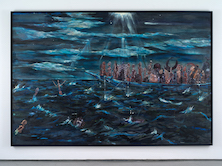Christopher Freeburg
Counterlife: Slavery After Resistance and Social Death

Through a rich array of cultural forms—literature, music, comedy sketches, and film— Counterlife deepens and broadens how we view portrayals of enslaved Africans in the US. This book conceptualizes slave social life and art discourse as counterlife. Counterlife emphasizes uncertainty, unaccountability, and instability that unsettles singular narratives and teloses, fixed categories and oppositions. For Professor Freeburg, the term “counterlife” is inspired by reading and observing of the work of artists and art curators like Philip Roth, Ralph Ellison, Thelma Goldman, and Radcliffe Bailey whose work emphasizes that concrete situations have multiple and simultaneous points of view.
Professor Freeburg will deploy counterlife to rediscover more profound mystery and instability than critics usually realize in the relations among black social life, artistic expression, and oppressive institutions. Thinking through counterlife helps to squarely address the relationship between the most influential frames for analyzing slave texts and their limitations. While many scholars of slavery studies frame their discussion in terms of political traction, Professor Freeburg will focus on how slaves establish religious practices, perform historical memory, and find meaning in artistic creation that does not achieve its force because of its refutation or entanglement of white domination.
